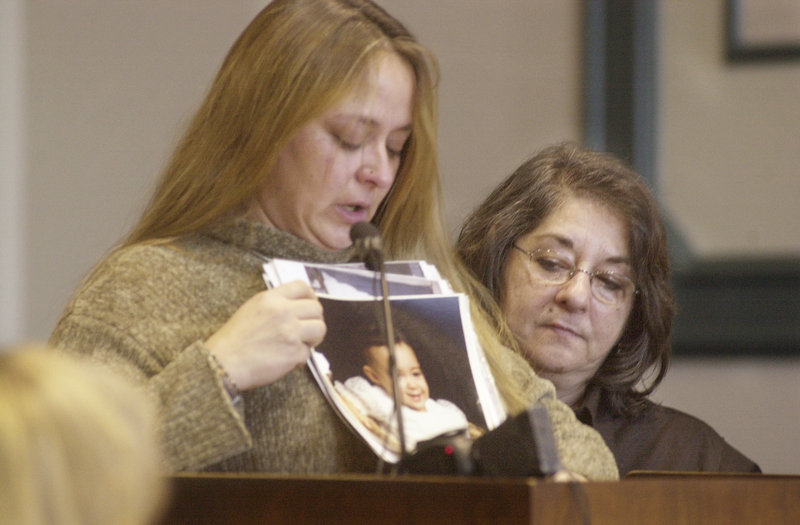Mary Farrar was on a hunting vacation in Maine with her husband in 1974 when she got the call from her mother that Billy, her older brother, had been shot during a holdup at his business in their New Jersey hometown.
Two hours later, she pulled off the turnpike, called to see if he was out of surgery and learned her brother was dead.
“It’s almost like you’re numb,” she said. “You have emotions but they’re in your body and you can’t release them.” She slammed the receiver again and again into the walls of the phone booth.
That pain gave her rare insight she used to help others as a victims advocate for the Maine Attorney General’s Office. Farrar spent 13 years as the person who held survivors’ hands and looked after their interests as tragedy threatened to overwhelm them during murder investigations and trials.
Farrar retired Thursday at age 62, her final two years spent as a victims advocate at the Department of Corrections, which allowed her to stay closer to home and have a more regular schedule.
She worked with murder victims’ families from 1996 to 2009. It left her a circle of close friends with whom she shared the darkest moments.
“Because she’s a homicide survivor herself, she can say to someone: ‘I’ve walked in your shoes. Here’s what you can expect,’” said John Leighton, whose sister Dawn was murdered in Buxton in 1998. Farrar was the family’s liaison through the trial, conviction and subsequent hearings. “She was aggressive as far as getting hold of us, being honest and up front, not holding information back.”
When Mark Bechard killed two nuns in Waterville in 1996, Farrar was there to help the surviving Sisters of the Blessed Sacrament negotiate the legal ordeal.
She was there at a funeral home one Christmas Eve as a father made arrangements for his baby, and a week later, on New Year’s Eve, with the family of a young girl who had been killed.
Arthur Jette met Farrar in 1999, a few days after his 2-year-old grandson Treven Cunningham was killed in Dexter along with the boy’s babysitter.
“She impressed us with her compassion and her sincerity,” Jette said. “From that day on, she spent a lot of time with us. She truly got to be integrated into the family.”
Farrar’s first work as a victims advocate was on child abuse cases at the Somerset County District Attorney’s Office in 1990.
Diminutive but unrelenting, Farrar sometimes frustrated officials as she pumped them for information on behalf of families.
During a recent interview in Augusta, Farrar shed light on what a survivor needs after a child, a sibling, a parent or even a close friend has been murdered.
“They want to know everything,” said Farrar. They are feeling powerless, vulnerable and trust no one. The advocate’s job is to explain what to expect, from the investigation, the press, the criminal justice system.
She has sat with a family all night before trial, preparing them for the ordeal, for the testimony of the medical examiner and the autopsy photos they will see.
“Can you imagine sitting through a court session and seeing that for the first time?” she asks.
She’s held hands of family members who were shaking so violently she had to lead them out of the courtroom, where they collapsing into her arms sobbing. She has taken others for walks to calm them down, afraid they would confront a killer in court.
“The worst thing that could ever happen to you in your life has happened and the person that did it is up there smiling,” she said. Family members cannot cry in court or they will be told to leave. One mother was told she had to lay aside her Rosary and prayer book.
Farrar did more than comfort. She would advocate, demanding information from prosecutors and police.
She has also had to explain why letting a killer plead to a lesser charge made the most sense, or brace a victim’s family for the possibility that a killer would not be convicted at all.
“I don’t know if I’ve ever done that successfully,” she said.
Farrar said she was not burned out on her job, despite its emotional demands.
Jette says he understands, and thinks it relates to her personal tragedy.
“There’s a strength that some of us seem to get from being able to help others through that journey,” said Jette, who now works as a victims’ advocate for a domestic violence organization and heads the Maine chapter of Parents of Murdered Children. “That can only come from the fact you’ve been tempered in some way by having had the experience of going through the process … and somehow you can convey that to others in a way that gives them hope that they, too, will be able to see themselves as survivors.”
Farrar says her personal experience may have helped her on the job, but her job has helped her cope with her own sorrow.
“It’s ‘the beast’ always waiting to surface and you’re always fighting it,” she said of that debilitating sense of loss. “I’ve been able to conquer my beast by working with these families.”
Staff Writer David Hench can be contacted at 791-6327 or at:
dhench@pressherald.com
Send questions/comments to the editors.



Success. Please wait for the page to reload. If the page does not reload within 5 seconds, please refresh the page.
Enter your email and password to access comments.
Hi, to comment on stories you must . This profile is in addition to your subscription and website login.
Already have a commenting profile? .
Invalid username/password.
Please check your email to confirm and complete your registration.
Only subscribers are eligible to post comments. Please subscribe or login first for digital access. Here’s why.
Use the form below to reset your password. When you've submitted your account email, we will send an email with a reset code.